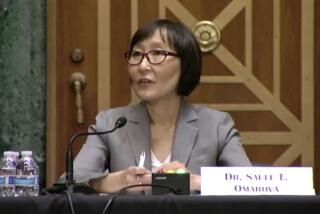Indonesia Bank Chief Dismissed Amid Conflict
- Share via
TOKYO — Indonesia fired its central bank chief Tuesday in a step that further escalates the conflict between President Suharto and the International Monetary Fund over a proposal to set a fixed exchange rate for the embattled rupiah.
While the plan might strengthen Indonesia’s currency at least in the short run, it could lead to the termination of a $43-billion IMF bailout package for Indonesia and a serious worsening of the Asian financial crisis. The IMF, the World Bank, the U.S. and other nations have expressed strong opposition to the idea.
The announcement of the dismissal of Bank of Indonesia Gov. Sudradjad Djiwandono gave no reason for his firing, but he is known as a critic of the fixed-currency idea. His successor is Sjahril Sabirin, a central bank director and U.S.-trained economist who is seen as favoring the proposal.
Suharto, faced with a collapsing currency and spreading riots, said last week that Indonesia should “quickly fix the currency at a certain rate” so that businesses can repay their foreign debts more easily. A stronger rupiah would also make food imports cheaper, easing a key cause of public anger.
Despite international condemnation of the plan, Suharto so far appears unmoved from his support for replacing the central bank with a “currency board” that would be bound to issue local currency only to the extent that it was matched by foreign reserves.
Critics say Indonesia’s economy is too unstable for a currency board to succeed. IMF Managing Director Michel Camdessus sent Suharto a letter last week, threatening to pull the plug on the IMF rescue deal if Suharto pressed ahead.
“What I expressed to President Suharto is that going to a currency board without previous consultation with the IMF . . . would be a violation of our arrangement,” Camdessus said Monday during a visit to Brussels.
Neither the United States nor the International Monetary Fund, both of which have urged Indonesia to not create a currency board now, made any effort to hide its displeasure over Suharto’s firing of his central bank chief.
An IMF spokesman, while declining to comment directly on “internal personnel decisions,” pointed out that Camdessus “has the full backing of the [IMF’s] executive board” to withdraw its rescue plan if Suharto establishes a currency board.
Later, in a briefing at the White House, Press Secretary Mike McCurry said President Clinton had already urged Suharto to not adopt the currency board plan.
Steve Hanke, a Johns Hopkins University economist who has been advising Suharto to adopt a currency board system, strongly defended the idea at a news conference Tuesday in Jakarta.
Hanke’s comments helped the rupiah strengthen slightly to 9,400 to the dollar. Last July, the rupiah stood at about 2,400 to the dollar. In January, it fell as low as 17,000 to the dollar. Expectations are that the rupiah might be pegged at around 5,000 or 5,500 to the dollar under a currency board system.
Neither the IMF nor the United States objects in principle to the establishment of a currency board, but international monetary authorities say the concept cannot succeed unless a country’s currency is stable and it has amassed substantial amounts of foreign reserves.
Currency boards have stabilized currency values in Hong Kong and several other places, but they eliminate a country’s control over its own interest rates and money supply.
In Indonesia’s case, however, the rupiah is continuing to fluctuate sharply, and the country has only $19 billion or so in reserves--a sum that is being depleted almost daily as the government is forced to exchange rupiahs for dollars to pay off foreign debts.
The greatest danger, critics say, is that without sufficient international confidence that a government is capable of defending the peg, speculators can attack the currency, driving interest rates to astronomical levels. That can ultimately force a devaluation that leaves the country shorn of its foreign exchange and in worse condition than before.
Critics have charged that the biggest pressure on Suharto to move to a currency board is coming from his children, whose state-subsidized conglomerates would benefit financially if the value of the rupiah did not plunge any further.
U.S. Treasury Secretary Robert E. Rubin reiterated that Indonesia must first deal with “the problems that gave rise to the instability” and then reestablish confidence in the financial markets.
Rubin also discounted suggestions that there might be region-wide impact from Vietnam’s decision on Tuesday to devalue its currency, the dong, by 5%. Vietnam has been among the few East Asian countries whose currencies hadn’t weakened during the region’s economic crisis.
Times staff writer Art Pine in Washington contributed to this report.
More to Read
Sign up for Essential California
The most important California stories and recommendations in your inbox every morning.
You may occasionally receive promotional content from the Los Angeles Times.












